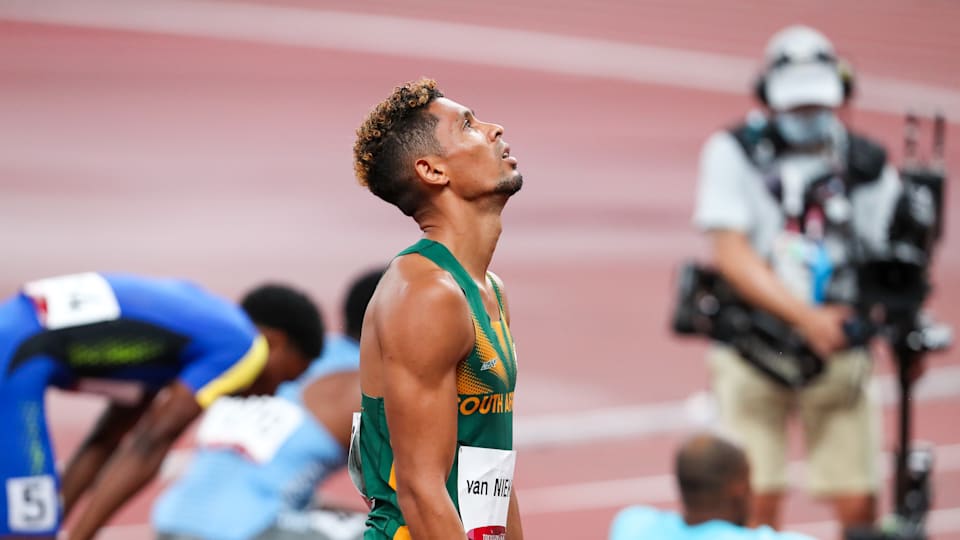Wayde van Niekerk and the race against time for South Africa's Olympic champion
The South African runner has struggled to return to his athletic peak ever since suffering a debilitating knee injury back in 2017 following his world record performance in 2016.

Time was once a thing Wayde van Niekerk had a mastery over.
Six years ago, the South African athletics ace electrified the world at the age of 24 when he clinched Olympic gold in the 400m at Rio 2016.
From lane eight he left the field in his wake, crossing the finish line in a world-record smashing 43.03, emphatically drawing a line through Michael Johnson's name to write his own in the annals of history.
When he defended his world championship title a year later at the showpiece event in London there was an overwhelming sense that the best was still to come from the man from Kraaifontein. What more can this athlete do?
But just as it looked like South Africa's hottest track talent was hitting his straps, van Niekerk’s world came collapsing down as he suffered a devastating, freak injury late in 2017 in a charity tag rugby match.
The sprint star tore both his anterior cruciate ligament (ACL) and meniscus cartilage in his right leg bringing his track career to a screaming stop.
Initially, the then 25-year-old was optimistic about his chances of returning, stating at the time he would only be out for the first half of the 2018 outdoor season.
If it meant skipping the Commonwealth Games on Australia’s Gold Coast then so be it.
But after weeks of rehabilitation in Colorado and then in Doha, the outlook soon changed and it became clearer that van Niekerk’s comeback would not be a matter of weeks, or even months, but years.
Time was no longer on his side.
When news began to spread as to the severity of the South African’s injury, questions were inevitably raised about whether he would ever return to competition.
Doubt from the outside trickled in and it wasn’t long before the two-time world champion found himself questioning whether he could ever reach those same heights again. He changed coaches and moved training bases to Florida in an attempt to find the form needed to get back to an elite level.
After two long years away the sprinter eventually did make his return to the track, but looked a shadow of his former self.
Though his mind was razor focused on defending his title at the delayed Tokyo 2020 Olympics in 2021, his body seemed less willing. Niggles, including a bone bruise as well as other smaller, biting injuries continued to hold the man from the Western Cape back as he kept trying to relaunch his various campaigns.
The hunt for qualification for the Games in the Japanese capital eventually ended on June 19 when the sprinter clocked a time 0.34 seconds inside the necessary standard.
It wasn’t pretty, but it was a relief.
Once at the Olympics, however, van Niekerk struggled for consistency and was subsequently eliminated from the men's 400m semi-finals after clocking 45.14 to finish the race in fifth.
The sprinter insisted afterwards it was his mind at fault and not his body. He told South Africa’s News24 at the time: “I didn’t execute my race as well as I’d have liked to because there was a mental aspect that I hadn’t considered.”
Without van Niekerk buoying their chances, Team South Africa ended the Games without a single track or field medal.
If 2020 (and 2021) were, for athletics, all about the Olympic Games then 2022 is the year of the world championships, slated for this July in Eugene, Oregon.
For van Niekerk it's another shot at redemption.
But this season, like much of the last, has got off to a troubled start.
After withdrawing from the 2022 ASA Senior Track and Field Championships in Cape Town in April, the man once tipped to be the next Usain Bolt, in scope and reputation, pulled up within the first 50 metres of his season opener in Triveneto, Italy.
“Another incomplete race, frustrations on a high,” he posted on his Twitter account shortly after the race hinting at his growing exasperation.
Questions now abound as to whether van Niekerk will ever manage to reclaim the form that catapulted him into his country's consciousness so gloriously back in 2015.
Given that 30 now looms large for the South African, could time now be getting the better of him?
As he himself posted on social media, the next few weeks will be extremely important.
